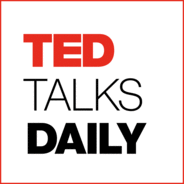Neuroscientist and pediatrician Kimberly Noble is leading the Baby's First Years study: the first-ever randomized study of how family income changes children's cognitive, emotional and brain development. She wants to find out: Can we help kids in poverty simply by giving families more money? "The brain is not destiny," Noble says. "And if a child's brain can be changed, then anything is possible."For a chance to give your own TED Talk, fill out the Idea Search Application: ted.com/ideasearch.Interested in learning more about upcoming TED events? Follow these links:TEDNext: ted.com/futureyouTEDSports: ted.com/sportsTEDAI Vienna: ted.com/ai-viennaTEDAI San Francisco: ted.com/ai-sf Hosted on Acast. See acast.com/privacy for more information.

Bildung
TED Talks Daily Folgen
Want TED Talks on the go? Everyday, this feed brings you our latest talks in audio format. Hear thought-provoking ideas on every subject imaginable – from Artificial Intelligence to Zoology, and everything in between – given by the world's leading thinkers and doers. This collection of talks, given at TED and TEDx conferences around the globe, is also available in video format. Hosted on Acast. See acast.com/privacy for more information.
Folgen von TED Talks Daily
2481 Folgen
-
Folge vom 02.04.2019How does income affect childhood brain development? | Kimberly Noble
-
Folge vom 01.04.2019How sci-fi inspired us to go to the Moon | Alexander MacDonaldLong before we had rocket scientists, the idea of spaceflight traveled from mind to mind across generations. With great visuals, author and NASA economist Alexander MacDonald shows how 300 years of sci-fi tales -- from Edgar Allan Poe to Jules Verne to H.G. Wells and beyond -- sparked a culture of space exploration. A fascinating look at how stories become reality, featuring a goose machine sent to the Moon.For a chance to give your own TED Talk, fill out the Idea Search Application: ted.com/ideasearch.Interested in learning more about upcoming TED events? Follow these links:TEDNext: ted.com/futureyouTEDSports: ted.com/sportsTEDAI Vienna: ted.com/ai-viennaTEDAI San Francisco: ted.com/ai-sf Hosted on Acast. See acast.com/privacy for more information.
-
Folge vom 29.03.2019Can we regenerate heart muscle with stem cells? | Chuck MurryThe heart is one of the least regenerative organs in the human body -- a big factor in making heart failure the number one killer worldwide. What if we could help heart muscle regenerate after injury? Physician and scientist Chuck Murry shares his groundbreaking research into using stem cells to grow new heart cells -- an exciting step towards realizing the awesome promise of stem cells as medicine.For a chance to give your own TED Talk, fill out the Idea Search Application: ted.com/ideasearch.Interested in learning more about upcoming TED events? Follow these links:TEDNext: ted.com/futureyouTEDSports: ted.com/sportsTEDAI Vienna: ted.com/ai-viennaTEDAI San Francisco: ted.com/ai-sf Hosted on Acast. See acast.com/privacy for more information.
-
Folge vom 28.03.2019A short history of trans people's long fight for equality | Samy Nour YounesTransgender activist and TED Resident Samy Nour Younes shares the remarkable, centuries-old history of the trans community, filled with courageous stories, inspiring triumphs -- and a fight for civil rights that's been raging for a long time. "Imagine how the conversation would shift if we acknowledge just how long trans people have been demanding equality," he says.For a chance to give your own TED Talk, fill out the Idea Search Application: ted.com/ideasearch.Interested in learning more about upcoming TED events? Follow these links:TEDNext: ted.com/futureyouTEDSports: ted.com/sportsTEDAI Vienna: ted.com/ai-viennaTEDAI San Francisco: ted.com/ai-sf Hosted on Acast. See acast.com/privacy for more information.
